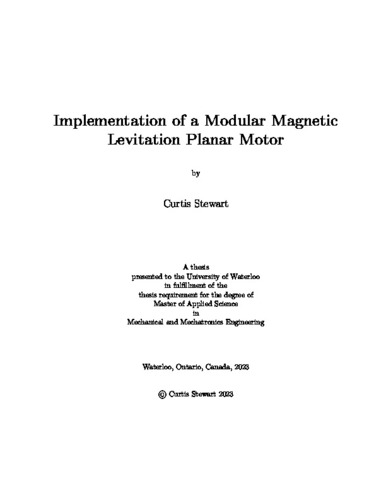| dc.description.abstract | A large-scale magnetically-levitated planar motor has the potential to revolutionize conveying and flexible manufacturing applications. The contactless nature nearly eliminates friction to produce less noise, vibration, and dust, which enables high-precision and energy-efficient operation. In this research, a maglev system is used which is newly designed and assembled by a team of graduate students at the Maglev Microrobotics Laboratory. The stator consists of square hollow-core coils and manipulates a levitated 2-D Halbach array mover. Three equipment setups are tested in this thesis: the 64-coil prototype with camera feedback, the 64-coil prototype with laser sensor feedback, and the MagFloor with camera feedback. The contributions of this thesis include the implementation of levitation through controller design and system integration, comparison of levitation precision, step responses, and trajectory tracking between the three setups, and improving the system performance through more advanced methods.
A PID control loop is designed in MATLAB/Simulink, with a PID for each of the six degrees of freedom of the mover and with a custom derivative calculation to overcome spikes from sensor sync issues, derivative kick, and measurement noise. The overall system integration is completed in TwinCAT and includes a visualization interface for user input and control of the system. The PIDs are first tuned by levitating the mover on a 64-coil prototype stator using a camera-based motion tracker for position feedback.
As expected, levitation precision is most precise with the eight laser sensors, with a precision of 0.005 mm in the xyz translation directions and 0.002° in the αβγ rotations. Conversely, the precision with the cameras is 0.008 mm in xy, 0.011 mm in z, 0.003° in αβ, and 0.002° in γ. Using the cameras further away on the MagFloor, the precision is reduced to 0.03 mm in xyz, 0.015° in αβ, and 0.01° in γ. The best step performance is found with the camera system on the 64 coils. For an 8 mm step in the x-axis with this setup, the rise time is as little as 0.045 s, the 2 % settling time is 0.088 s, and the overshoot is 0.275 %. Using ramp trajectories on the MagFloor, the maximum speed is found to be 500 mm/s in the xy plane and 75 °/s about the yaw rotation, which can achieve the full 360° range.
The levitation performance is further improved through the addition of a state estimator and an iterative learning controller (ILC). The state estimator compensates for the 7 ms system latency when using the camera feedback. This reduces the force and torque error, resulting in smaller fluctuations and raising the maximum speed. With this strategy, the maximum speed on the MagFloor is increased to 1000 mm/s in xy and 360 °/s in yaw. The tracking error is reduced through the addition of ILC on top of the state estimator. On the 64 coils, the mean absolute error in x during the 500 mm/s region of an x-ramp decreased from 4.862 mm to 0.397 mm from the first to tenth iteration. The fluctuations in the levitation gap and the rotation axes are also reduced. The most significant improvement is seen in the 64-coil prototype, which has smaller measurement noise than the MagFloor.
Lastly, further improvements to the system are discussed as potential future work. These include improvements to methods discussed in this research as well as the next steps towards realizing a planar motor for conveying or flexible manufacturing applications. | en |

